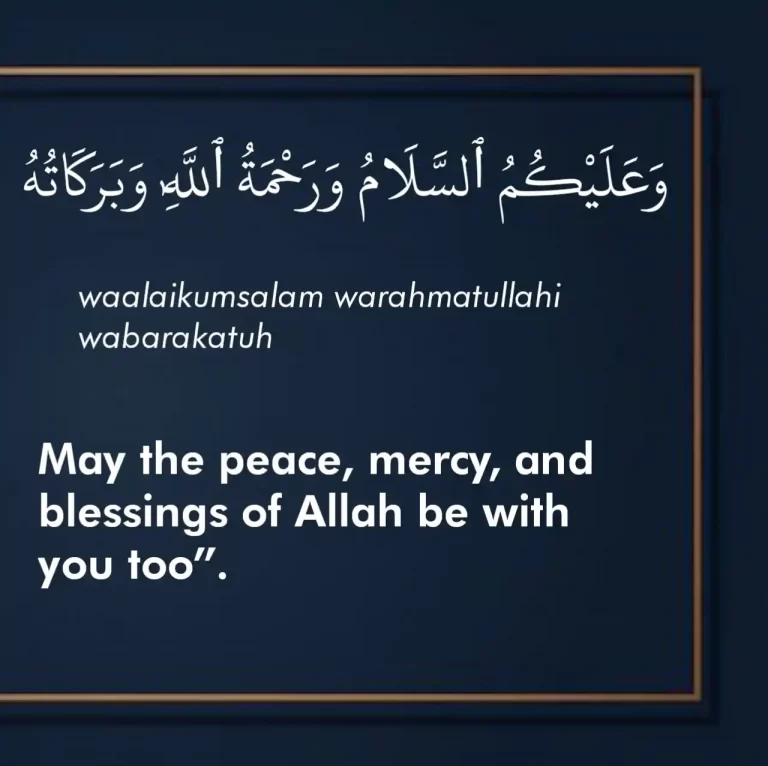We Belong To Allah and to Him We Shall Return In Arabic And Benefits
We belong to Allah and to Him we shall return is an Islamic phrase called istirja. It is pronounced as inna Lillahi Wa Inna Ilayhi Raji’un in Arabic. It is a Quranic command for Muslims, mentioned in surah Baqarah, the second surah of the Quran.
Advertisements
The phrase is commonly recited by Muslims, especially upon hearing bad news that has fallen upon themselves or another, both as a sign of patience and an acknowledgement that Allah is the almighty, and he will not test his worshippers more than they can bear. It is also usually used by Muslims when someone dies.
You may be wondering what these words mean. And why should we as Muslims say it and under what circumstances? Continue reading to find out the answers to these questions and lots more.
We Belong To Allah and to Him We Shall Return in Arabic
In arabic to Allah we belong and to Him we shall return is written as,
إِنَّا لِلَّٰهِ وَإِنَّا إِلَيْهِ رَاجِعُونَ
Advertisements
The transliteration is inna Lillahi Wa Inna Ilayhi Raji’un.
To translate this phrase, there are different translations of the words from different scholars but the meaning remain the same.
Inna Lillahi wa inna Ilaihi rajiun in English means
- Indeed, to Allah we belong and to Allah we shall return. Or
- Indeed, we belong to Allah and to Him we shall return.
Read also How To Say Peace Be Upon You In Arabic, Response And Benefits
We Belong to Allah and to Him We Shall Return Ayah
Indeed, to Allah we belong and to Him we shall return is mentioned in ayah 156, Surah Baqarah, the second and longest surah in the Quran. The full aya is:
Advertisements
Who, when disaster strikes them, say, “Indeed we belong to Allah, and indeed to Him we will return.”

We Belong to Allah, And Indeed to Him We Will Return Complete Dua
The complete Dua of inna lillahi wa inna ilayhi raji’oon is
إِنّا للهِ وَإِنَا إِلَـيْهِ راجِعـون ، اللهُـمِّ اْجُـرْني في مُصـيبَتي، وَاخْلُـفْ لي خَيْـراً مِنْـها
Advertisements
Transliteration
Innā lillāhi wa innā ilayhi rāji`ūn, Allāhumma-jurni fī muṣībatī wa ‘khluf lī khayran minhā.
Meaning
We are from Allah and unto Him we return. O Allah take me out of my plight and bring to me after it something better.
Allah describes thus disaster strikes them or when afflicted with calamity in the these verses.
Calamity is anything that causes mental anguish or physical harm, or both.
To Allah we belong that is, Allah owns us and we are under His control; we have no control over our own selves and property at all.
If we are tested with regard to some of it, then the Most Merciful has decreed something concerning His slaves and their property as He wills, so there should be no objection to Him.
Rather it is part of being a true slave of Allah (‘uboodiyah) to realise that the calamity has been decreed by the Sovereign, the Most Wise, Who is more merciful to him than he is to himself.
This gives him a sense of contentment and acceptance of Allah’s decree, which makes him grateful to Allah for decreeing for His slave that which is good for him, even if he does not realise it.
In addition to the fact that we belong to Allah, we will return to Him on the Day of Resurrection, when He will requite each person in accordance with his deeds.
So if we show patience and seek reward, we will find our reward waiting for us with Him, but if we are impatient and resentful, our share will be nothing but resentment and the loss of reward.
Knowing that we are slaves of Allah and will return to Him is among the greatest means of attaining patience.
The Virtue of asserting that We all belong to Allah, during Afflictions.
There are several Hadiths that mention the rewards of admitting that the return is to Allah by saying:
“Truly, to Allah we belong and truly, to Him we shall return” when afflictions strike.

For instance, Imam Ahmad reported that Umm Salamah narrated:
Once, Abu Salamah came back after he was with Allah’s Messenger and said: I heard Allah’s Messenger recite a statement that made me delighted.
He said: No Muslim is struck with an affliction and then says Istirjawhen the affliction strikes, and then says:O Allah! Reward me for my loss and give me what is better than it,’ but Allah will do just that.
Umm Salamah said: So I memorized these words.
When Abu Salamah died I said Istirja` and said:”O Allah! Compensate me for my loss and give me what is better than it.”
I then thought about it and said, “Who is better than Abu Salamah?”
When my Iddah (the period of time before the widow or divorced woman can remarry) finished, Allah’s Messenger asked for permission to see me while I was dyeing a skin that I had. I washed my hands, gave him permission to enter and handed him a pillow, and he sat on it.
He then asked me for marriage and when he finished his speech, I said, “O Messenger of Allah! It is not because I do not want you, but I am very jealous and I fear that you might experience some wrong mannerism from me for which Allah would punish me. I am old and have children.”
He said: As for the jealousy that you mentioned, Allah the Exalted will remove it from you. As for your being old as you mentioned, I have suffered what you have suffered. And for your having children, they are my children too.
She said, “I have surrendered to Allah’s Messenger.” Allah’s Messenger married her and Umm Salamah said later,
“Allah compensated me with who is better than Abu Salamah: Allah’s Messenger.”
Muslim reported a shorter version of this Hadith
We belong to Allah and to Him we shall return.’ For every affliction, one should say: ‘Inna lillahi wa inna ilaihi rajiun – We belong to Allah and to Him we shall return.’
For the affliction of death, one should add: ‘Allahumma Ajjurni fi musibati wakhluf li khairan minha, meaning O Allah compensate me in my affliction, recompense my loss and give me something better in exchange for it.
’Umm Salamah, the wife of Aboo Salamah, heard the Messenger of Allah It saying this when her husband, who was the most beloved of all people to her, died.
So, she made this supplication because she believed in it. When her waiting period ended, the Prophet SAW proposed to marry her, and he was better than Aboo Salamah without doubt.
Trials could be health-related, wealth-related, or it could be the life of our loved ones.
Whenever calamities like these happen, don’t turn on your heels because you’ll lose out a lot in this world and the next.
Never lose faith in Allah just because you’re hurt, rather accept the fact that He brought us to this world, He can do as He pleases, and to Him is our shall return.
True believers recite these words to console themselves in the face of their losses. Because they know that they belong to Allah and that He does what He wills with His servants.
They also know that no deed, even if it was the weight of an atom, will be left out on the Day of resurrection.
These facts should give us all the strength to believe that we are Allah’s slaves and that to Allah will be our return.
And Allah knows best!
Advertisements








One Comment